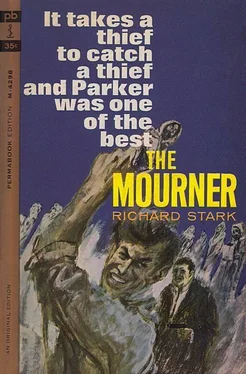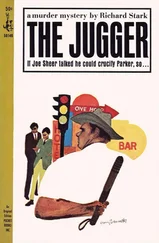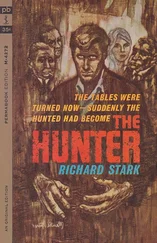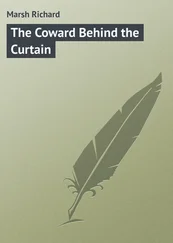His left arm was stiffening up. The fingers wouldn’t work right. He transferred the Terrier to his left hand, so he could get out a cigarette, and the hand wouldn’t hold onto the gun. It fell to the carpet. Parker cursed under his breath, and left it there. He lit a cigarette, and leaned his head back against the wall, and sat there with the cigarette in his mouth, listening to the party noises and Handy’s uneven breathing. His feet were out in front of him, and his arms were hanging at his sides, the hands resting palm up on the floor. A pins-and-needles feeling kept running up and down his left side and down his left arm. His fingers on that side felt like sausages, thick and unresponsive.
The seconds limped by, dragging sacks, forming into long lines. Every line took forever to form, and then was only one more minute. Parker lit a fresh cigarette off the butt of the old one. Then that cigarette was smoked down, and he lit another fresh one. And again.
They were happy as hell downstairs.
This was six. Six times in his life he’d been shot. And this was the second time he’d been left for dead. The first time, it had been a heavier slug, and well aimed, but it had hit his belt buckle instead of his stomach, and he’d managed to crawl away from that one with only the loss of appetite for a while. In England, in forty-four, an MP had winged him when he’d taken a truckful of stolen tires through a roadblock. And three other times it had happened. He was almost as shot up as Tom Mix.
He tried to lift his left arm so he could look at his watch, but the arm felt as though it had been injected full of lead. He reached over with his right hand and grabbed his left wrist and lifted. It was a quarter after one. The sweep-second hand was in no hurry; the other two hands were just painted on.
They were too happy down there. Why the hell didn’t they go home?
What if Kapor decided to show somebody all his pretty statues?
Parker grimaced, and reached over with his right hand to pick up the Terrier. He held it in his lap, and smoked, and waited. Whenever he finished a cigarette, he butted it against the wall board. There weren’t any ashtrays handy.
Handy sounded like he was snoring. Blood in his throat, probably. So maybe he wouldn’t make it, and the fat bastard would be batting five hundred.
It was getting quieter downstairs. He lifted his hand again to look at his watch, and it was twenty to two. He felt as though he’d been sitting here for days. The burning had lessened in his side, and so had the pins and needles. Now there was a dull numbness, with a low throbbing pain behind it.
Quieter and quieter. He reached up and, grabbing the doorknob, pulled himself upright. The green darkness closed in again, and he waited, leaning against the wall next to the doorway, until slowly it faded away again. The cigarettes hadn’t helped; they’d just made him more lightheaded.
When he could take a chance on walking, he went through the doorway and lurched across to the opposite wall, so he could lean his right side against it. He moved along, more slowly than he wanted, until he got to the head of the stairs. He peered around the edge of the wall, and he was looking down at the big front hall, with a parquet floor. The front door was open, and people were leaving. Kapor was smiling and nodding, and telling them all good-bye. They were speaking a lot of different languages, French and German and some others. Nobody was speaking English.
It took them a long while to clear out. Two or three loud-mouthed women in furs took the longest. Then the front door closed at last, and only Kapor and his butler-bodyguard were left standing in the hall.
Kapor said something, and the bodyguard bowed and went away. They were both wearing formal dress, like waiters. Kapor yawned, patting his mouth with the back of his hand. Then he took out a flat gold cigarette case and took his time lighting a cigarette. When he finally had it going, he turned around and started up the stairs.
He was short and slender and a dandy, with a hawk face and ferret eyes. His hands and face were so pale they looked as though they’d been dusted with flour. He didn’t see Parker until he was all the way to the top of the stairs. When he saw Parker, and the gun, he opened his mouth wide without making any sound.
Parker said, “Keep it soft. Walk ahead of me to the trophy room.”
“The what?”
“The statues,” Parker said.
Sudden alarm showed on Kapor’s face, and then was wiped away again. “What are you doing here?”
“We’ll talk. In the trophy room.”
“Shall I shout for help?”
“You won’t shout twice. Move.”
Kapor hesitated, thinking it over, but his eyes kept flicking past Parker toward the room where the statues were. He wanted to know if the money was still in the Apollo. He shrugged and walked past Parker down the hall.
“Move slow.”
Kapor glanced back at him. “I see you’ve been wounded.”
“Just move slow and steady.”
Parker braced himself, and then staggered over to the opposite wall. He wanted to keep his right side as a support.
Kapor walked into the room first, and stopped short in the doorway staring at the wreckage. Then he saw the Apollo, with its head off. “What has hap—”
“That’s right,” Parker told him. “It’s gone.”
Parker followed him in, and closed the door. He leaned his back against it. He would have liked to sit down on the floor again, but it would have been wrong psychologically.
Then Kapor saw Handy lying there, breath still bubbling faintly in and out of him. “Is he the one who shot you?”
“No. You ever hear of Menlo?”
“Auguste Menlo?” Kapor looked surprised, and then frightened, and then artificially surprised. “What would the Inspector have to do with this?”
“We’re going to make a deal, Kapor.”
“We are? I don’t know yet what you’re talking about.”
“The hundred grand is gone. Go take a look in the statue. It’s gone.”
“I can see that.”
“I can get you half of it back.”
“Half?”
“That’s better than none.”
Kapor glanced at Handy. “He’s dying,” he said.
“If he dies, the deal’s off.”
“What deal? Say what you’ve got to say.”
“I can tell you things you want to know. And I can get you half the dough back. That’s what I do for you. What you do for me — you get a doctor who won’t make a police report on bullet wounds. In your job, you must know a doctor like that.”
Kapor nodded briefly. His eyes were wary.
“You also take care of my partner. Keep him here till he’s on his feet. When he’s well enough to travel, I give you your dough back.”
“How do I know you can get it back?”
“I know who’s got it, and where he’s going.”
“You seem sure.”
“I am sure. He’s too greedy not to go there.”
“Whatever that may mean. This other point. You said you could tell me something I might want to know. What would that be?”
“Is it a deal?”
“How do I know, until I’ve heard what you have to tell me?
“Forget that part. That’s bonus. For half the dough back, is it a deal?”
Kapor shrugged, and looked at Handy. “I think he will die anyway. Then you won’t get me the money.”
“So make up your mind quick. The sooner he sees a doctor, the better.”
“If he is going to die, and I get no money, why should I deal with you?”
“It’s worth the chance.”
“Possibly.”
“Definitely. You don’t have a week to think it over.”
“Very true. All right, it’s a deal.”
“I want a doctor. Fast. For him, to keep him alive. And for me, to tape me up so I can travel. If I can’t travel, I can’t get you your dough back.”
Читать дальше












